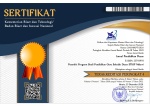SELF-EFFICACY CALON GURU SEKOLAH DASAR YANG BERDOMISILI ASAL DARI REMOTE AREA
DOI:
https://doi.org/10.46368/jpd.v10i2.887Abstract
Abstract: This study aims to measure the self-efficacy of prospective primary education teachers who come from remote areas. The self-efficacy of prospective elementary school teachers who come from remote areas is in the average group. The method used is quantitative descriptive research The sample of this study was 73 elementary school teacher education students at STKIP Melawi. primary school teacher education at STKIP Melawi. The method applied in the sampling process is purposive random sampling. The results found that the self-efficacy of prospective elementary school teachers who were domiciled from remote areas was in the average group. Therefore, efforts are needed to improve self-efficacy so that elementary school teachers who are domiciled from remote areas are able to convince themselves to learn and teach in elementary schools around Melawi Regency.
Â
Keywords: remote areas, self-efficacy, elementary school, teacher, rural area
Â
Abstrak: Penelitian ini bertujuan mengukur self-efficacy calon guru pendidikan dasar yang berasal dari remote areas. self-efficacy calon guru sekolah dasar yang berasal dari remote areas berada pada kelompok rata-rata. Metode yang digunakan adalah penelitian deskriptif kuantitatif Sampel penelitian ini ada 73 mahasiswa pendidikan guru sekolah dasar di STKIP Melawi. pendidikan guru sekolah dasar di STKIP Melawi. Cara yang diterapkan dalam proses pengambilan sampel yaitu purposive random sampling. Hasil menemukan bahwa self-efficacy calon guru sekolah dasar yang berdomisi dari daerah remote areas berada pada kelompok rata-rata. Maka dari itu, perlu upaya dalam meningkatkan self-efficacy agar caon guru sekolah dasar yang berdomisi asal dari remote areas mampu menyakinkan diri untuk belajar dan mengajar di sekolah dasar yang ada di sekitar Kabupaten Melawi.
Â
Kata Kunci: daerah terpencil, efikasi diri, sekolah dasar, guru, daerah tertinggal
References
Ames, P. C. (2003). Gender and learning style interactions in students’ computer attitudes. Journal of Educational Computing Research, 28(3), 231–244. https://doi.org/10.2190/M8CU-DE21-BJF1-84MN
Bandura, A. (1977). Self-efficacy: Toward a Unifying Theory of Behavioral Change. Psychological Review, 84(2), 191–215.
Bates, A. B., Latham, N., & Kim, J. (2011). Linking Preservice Teachers’ Mathematics Self-Efficacy and Mathematics Teaching Efficacy to Their Mathematical Performance. School Science and Mathematics, 111(7), 325–333. https://doi.org/10.1111/J.1949-8594.2011.00095.X
Bouchamma, Y., Basque, M., & Marcotte, C. (2014). School Management Competencies: Perceptions and Self-Efficacy Beliefs of School Principals. Creative Education, 05(08), 580–589. https://doi.org/10.4236/CE.2014.58069
Firdaus, F., Sulfasyah, S., & Nur, H. (2018). Diskriminasi Pendidikan Masyarakat Terpencil. Equilibrium: Jurnal Pendidikan, 6(1), 33–43.
Fransiska. (2018). MOTIVASI GURU PAUD BERTAHAN MENGAJAR DI DAERAH TERPENCIL. Educhild.Ejournal.Unri.Ac.Id, 7(1).
Hapsah, R., Siti, D., & Savira, I. (2015). Hubungan antara Self Efficacy dan Kreativitas dengan Minat Berwirausaha. Jurnal Psikologi Teori Dan Terapan, 5(2), 80–89. https://doi.org/10.26740/JPTT.V5N2.P80-89
JDIH BPK RI. (2005). PP No. 57 Tahun 2005 tentang Hibah Kepada Daerah.
Muri’ah, S., & Samarinda, I. (2018). Strategi Pengembangan Pendidikan Wilayah Perbatasan (Studi Kasus pada Madrasah Ibtidaiyah Tapal Batas Sebatik dan Nunukan). FENOMENA, 10(2), 135–148. https://doi.org/10.21093/FJ.V10I2.1340
Pardimin, P. (2018). SELF-EFFICACY MATEMATIKA DAN SELF-EFFICACY MENGAJAR MATEMATIKA GURU MATEMATIKA. Jurnal Ilmu Pendidikan, 24(1), 29. https://doi.org/10.17977/UM048V24I1P29-37
Sumartini, T. S. (2020). Self Efficacy Calon Guru Matematika. Mosharafa: Jurnal Pendidikan Matematika, 9(3), 419–428. https://doi.org/10.31980/MOSHARAFA.V9I3.797
Ünlü, M., & Ertekin, E. (2013). The Relationship between Mathematics Teaching Self-efficacy and Mathematics Self-efficacy. Procedia - Social and Behavioral Sciences, 106, 3041–3045. https://doi.org/10.1016/J.SBSPRO.2013.12.350
Vito, B., & Krisnani, H. (2015). KESENJANGAN PENDIDIKAN DESA DAN KOTA. Prosiding Penelitian Dan Pengabdian Kepada Masyarakat, 2(2).





